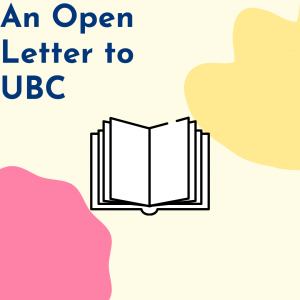
Dear Instructors at UBC Vancouver,
The AMS would like to commend you for all of the extra hours and hard work put into the restructuring of curriculum and adjusting to online platforms since the start of the pandemic. We appreciate all the hard work and adaptability you have shown us, and wish to express our gratitude on behalf of all UBC students.
When the original version of this letter was written to UBC, the average Vancouver campus student was spending about $900 on textbooks. Two academic years later this number has increased by about $300, with students respondents in our 2022 Academic Experience Survey reporting spending an average of $1253 per year on textbooks and other course materials. Along with that, seventy percent of students reported going without at a textbook or other course resource at least once due to cost.
Open Education Resources (OER) are teaching and learning resources made freely available through the public domain or open copyright licenses. They include full courses, course materials, modules, textbooks, streaming videos, tests, software, and any other tools, materials, or techniques used to support access to knowledge. OER create accessible learning opportunities on a large scale by eliminating cost barriers to educational resources and providing opportunities to use, reuse, adopt, and adapt resources for sustainable use in classrooms.
In 2022 90% of undergraduate students reported being able to use an OER in lieu of a textbook at least once, which is a 42% increase from 2020. The widespread adoption of OER by UBC professors has been commendable for reducing financial barriers for students. In the last academic year the replacement of traditional textbooks with OER saved students an estimated $1.9 to $2.7 million. We hope that you would consider joining us in advocating for more equitable access to education through contributing to open education initiatives. By choosing to use OER in the classroom, you make a direct impact on students by removing socio-economic barriers to accessing education. Instructors who choose to use OER are able to amend these materials to match the specific course they are teaching, therefore not having to fit the rigid material of a textbook to a unique course. Students are even able to take on roles as content creators, meaning they can be directly involved in their learning experience and participate within the scholarly community.
There are many ways for professors to become involved with open education initiatives, and here are just a few:
- Adopt an openly licensed textbook or class materials for your class. Many options are ready to be used or edited to fit your specific needs. To find open textbooks, including BC Campus Collections, use the OER Guide available on the UBC Library Website.
- When utilizing homework tools or online learning materials made by third party vendors used for assessment, consider the Principles for Digital Learning Materials Used for Assessment endorsed by Senate. These principles provide guidance on the best practices to take into consideration student affordability, accessibility, and agency. Examples include a $65 cap on these materials, per three credit course and 20% of total course mark.
- Use Creative Commons licensing on your work to let other people know they can use it. This can be applied to anything from articles to PowerPoint slides. You can learn more about open licensing and its implications for your scholarship on the Creative Commons guide.
- Create new Open Educational Resources. UBC offers many grants and supports for the development of OER. Apply to the Open Education Resource Fund, which in 2020 committed $250,000 in annual funding for the next three years to support OER initiatives at UBC. While 2022-23 is the final year funding was committed for, the Student Affordability Taskforce is recommending this be renewed again for another three years.
If you would like to learn more about open education, we encourage you to visit the Open UBC website and our webpage on the AMS’s OER campaigning, resources, and current opportunities. We appreciate all of the hardwork and flexibility displayed by our educators during this time, and we are confident that you will support our university’s commitment to affordable and accessible education. We hope you will join us in promoting equity in the classroom by keeping the cost of course materials low and adopting open alternatives. Please express your support by signing this open letter through the link below.
Sincerely,
The Alma Mater Society
